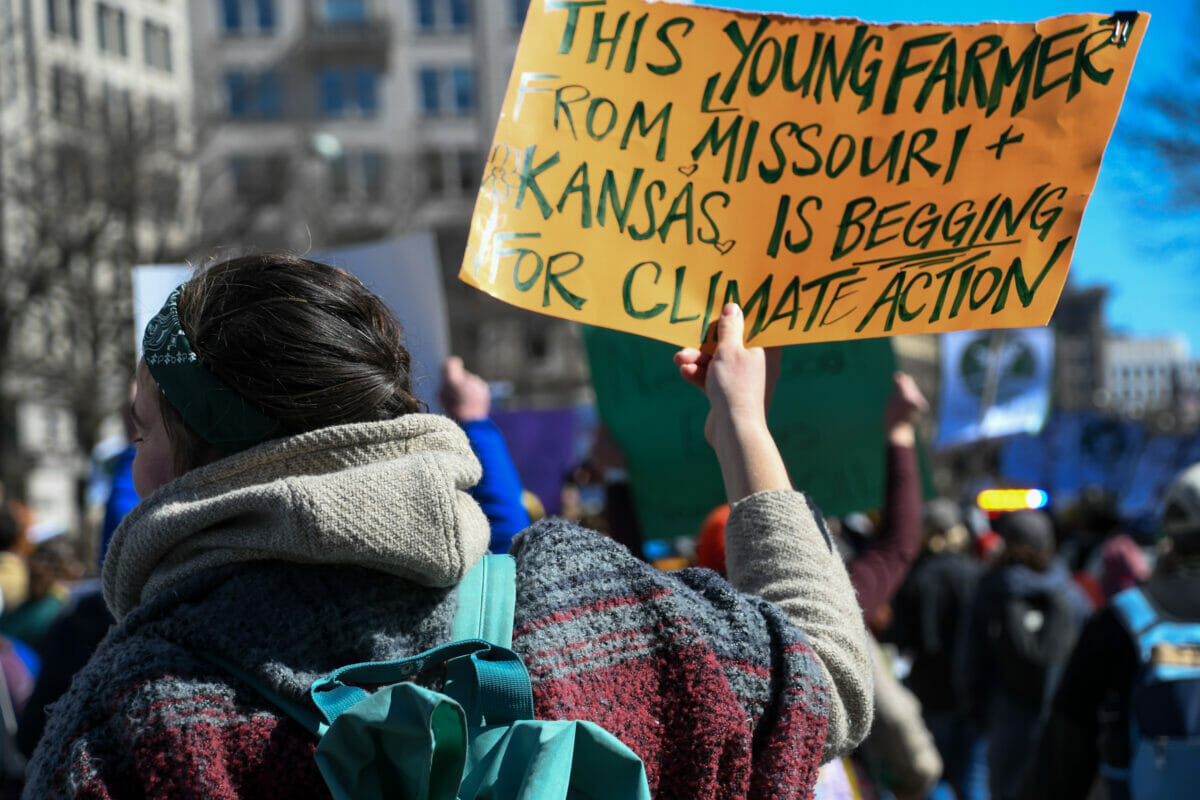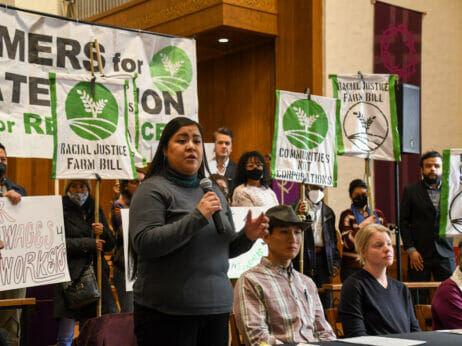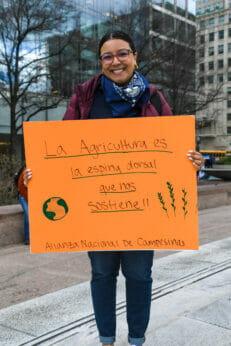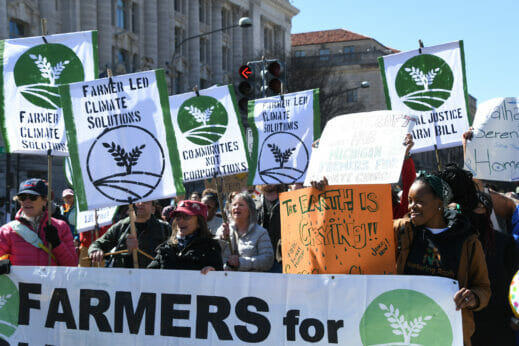‘Communities, Not Corporations’: Farmers March for Climate Action in D.C.
Farmers and advocates took to the streets of Washington, D.C. in a united call for racial justice, farmworker rights and climate solutions in the upcoming Farm Bill.
‘Communities, Not Corporations’: Farmers March for Climate Action in D.C.
Farmers and advocates took to the streets of Washington, D.C. in a united call for racial justice, farmworker rights and climate solutions in the upcoming Farm Bill.

Lydia Nebel, the farm director at KC Farm School in Kansas City, MO., wants to see more cost sharing programs for young farmers to acquire land in the 2023 farm bill.by Marin Scotten.
Hundreds of farmers and farmworkers gathered in Washington, D.C. this week to demand that Congress prioritize farmer-led climate solutions in the 2023 Farm Bill.
On Tuesday, farmers and their allies marched from Freedom Plaza to Capitol Hill, sharing stories of how the climate crisis has affected their farms and communities. On Wednesday, farmers and advocates met with various congressional offices to state their needs and what they want to see included in the upcoming bill.
The three-day event, called Farmers for Climate Action: Rally for Resilience, was organized by more than two dozen organizations, including the National Sustainable Agriculture Coalition (NSAC) and the HEAL Food Alliance.
The Farm Bill is a package of legislation passed every five years that has a significant impact on the livelihoods of farmers around the country. Some of the top priorities for the event’s attendees are racial justice, farmworker rights, support for climate-friendly farming practices and equitable access to farmland. Nearly every demand emphasized that Congress should prioritize communities over corporations.
Racial justice
At the event’s press conference on Wednesday, Dorathy Barker, owner of Olusanya Farm in Oxford, N.C., said previous farm bills were never written with Black and Indigenous folks or people of color (BIPOC) in mind.
The United States Department of Agriculture (USDA) has a long history of discriminatory lending practices towards Black farmers. Many lending programs and incentives included in previous farm bills, such as the Conservation Stewardship Program (CSP), were designed to protect the livelihoods of white farmers and agribusinesses, according to a report by the HEAL Food Alliance.
“As much as things change, they stay the same for Black people,” says Barker.
She wants to see more technical support and outreach assistance in Black communities. The problem isn’t a lack of funding — it’s distributing that funding to Black farmers on the ground, says Barker.

Mercy Kariuki-McGee, co-founder of Haki Farmers Collective, says this united demand from farmers is happening at a crucial time, when immediate action is needed.
“Black people, the people at the bottom, we are the ones who have to take on the heat. So we need solutions,” says Kariuki-McGee.
Farmworker rights
In its recommendations for the 2023 Farm Bill, the HEAL Food Alliance says the safety and well-being of food chain workers must be prioritized in policymaking in order to create an equitable food system.
Farmworker and advocate Marielena Vega says climate change has worsened the already harsh working conditions for farmworkers in recent years. In her hometown of Wilder, Idaho, there is little to no protection for farm workers from extreme heat, smoke from wildfires and poor air quality due to pesticide exposure.
A daughter of Mexican immigrants, Vega grew up watching her parents work long hours in Wilder’s apple orchards, where she eventually began working herself. She’s seen members of her community continue to work through illness and well into their eighties because they aren’t afforded the luxury of sick days or severance pay.

“As it stands right now, our farmworkers are out there every day, paid low wages, working under harsh conditions, missing out on core memories with their loved ones, being exposed to who knows what, just to not even be able to afford a day off or to afford the food that they grow and help harvest,” Vega said in her speech to the rally crowd on Tuesday. “That’s unacceptable.”
Right now, workers in agriculture are exempt from overtime pay in the Fair Labor Standards Act (FLSA). According to the FLSA, farmworkers do not have to be paid time and a half for hours worked over 40 per week. Many states also exempt farmworkers from state-level minimum wage that is above the federal minimum of $7.25.
Amy Tamayo, policy and advocacy coordinator at Alianza Nacional de Campesinas, says her organization is pushing for Congress to eliminate these wage exemptions. Alianza de Campesinas is the first national womens’ farmworker organization in the US.
Women farmworkers are often most vulnerable to unsafe working conditions and face further challengessuch as sexual harassment and gender-based discrimination in the workplace, says Tamayo. She wants to see more outreach and support from the USDA to farmworker women.

Climate-friendly practices
A major priority among all organizations that attended the event is support for farming practices that are climate-friendly and resilient to extreme weather conditions. This includes investments in organic, agroecological and regenerative systems.
Sarah Voiland, co-owner of Red Fire Farms, a 200-acre organic vegetable farm in Massachusetts, says worsening weather conditions make it a yearly challenge to keep farming.
In 2021, Voiland lost a large amount of crop to record rainfall. In 2022, a severe drought was the challenge. She specifically wants the Agriculture Resilience Act to be included in this year’s Farm Bill.
If implemented, the act would give farmers the tools they need for climate-friendly practices and increase their land’s resilience to extreme weather. It also includes financial assistance to improve soil health on agricultural lands, which Voiland says is crucial in sustaining small-scale farms.
“There’s so much soil degradation that’s happened from mono-cropping industrial agriculture over the last seven years. We’ve lost so much and we need to fix that,” she says.
Access to land
Farmland has increasingly become a financial investment for multinational corporations and wealthy individuals in the last fifteen years. Many investors are buying large plots of farmland at high prices that small-scale farmers can’t afford. Because of this consolidation, farmland prices have nearly doubled since 2005, making land extremely inaccessible for beginning and young farmers.
According to the National Young Farmers Coalition, secure access to farmland is the number one barrier for emerging farmers. Black farmers face additional challenges in acquiring farmland due to a long history of legal discrimination and lack of support from the USDA.
As part of its One Million Acres for the Future Campaign, the National Young Farmers Coalition called on Congress to invest $2.5 billion over the next 10 years to facilitate equitable land access for the next generation of farmers.
“We need access. We need access to funding, we need access to land. I think land ownership is one of our biggest issues,” says Nyema Clark, a young farmer and the founder of Nurturing Roots Farm in Seattle, WA.
It meant a lot to her to see so many people gathered in the nation’s capital to fight for a better food system.
“This is like a dream. Being able to be here with my sisters in farming, meeting more farmers of color that are out here trying to to save the world,” says Clark.

Communities, not corporations
The many farmworkers at the event’s press conference were joined briefly by Congressman Ro Khanna, who stated his support and appreciation for the small-scale farmers who are stewarding land across the country.
What needs to be addressed in policy is the corporate monopolization of nearly every aspect of agriculture, said Khanna.
In July 2021, Khanna, along with Sen. Cory Booker, reintroduced the Farm System Reform Act to “create a level playing field for independent farmers” and “crack down on the monopolistic practices of meatpackers and corporate integrators.”
“You being here and you mobilizing will help us with these reform efforts, will help us take on these monopolies and will help us empower farmers to be part of the solution for climate,” Khanna said to the crowd of farmers on Wednesday morning.
The 2023 Farm Bill will be voted on by Congress later this year.
Follow us

This work is licensed under a Creative Commons Attribution-NoDerivatives 4.0 International License.
Want to republish a Modern Farmer story?
We are happy for Modern Farmer stories to be shared, and encourage you to republish our articles for your audience. When doing so, we ask that you follow these guidelines:
Please credit us and our writers
For the author byline, please use “Author Name, Modern Farmer.” At the top of our stories, if on the web, please include this text and link: “This story was originally published by Modern Farmer.”
Please make sure to include a link back to either our home page or the article URL.
At the bottom of the story, please include the following text:
“Modern Farmer is a nonprofit initiative dedicated to raising awareness and catalyzing action at the intersection of food, agriculture, and society. Read more at <link>Modern Farmer</link>.”
Use our widget
We’d like to be able to track our stories, so we ask that if you republish our content, you do so using our widget (located on the left hand side of the article). The HTML code has a built-in tracker that tells us the data and domain where the story was published, as well as view counts.
Check the image requirements
It’s your responsibility to confirm you're licensed to republish images in our articles. Some images, such as those from commercial providers, don't allow their images to be republished without permission or payment. Copyright terms are generally listed in the image caption and attribution. You are welcome to omit our images or substitute with your own. Charts and interactive graphics follow the same rules.
Don’t change too much. Or, ask us first.
Articles must be republished in their entirety. It’s okay to change references to time (“today” to “yesterday”) or location (“Iowa City, IA” to “here”). But please keep everything else the same.
If you feel strongly that a more material edit needs to be made, get in touch with us at [email protected]. We’re happy to discuss it with the original author, but we must have prior approval for changes before publication.
Special cases
Extracts. You may run the first few lines or paragraphs of the article and then say: “Read the full article at Modern Farmer” with a link back to the original article.
Quotes. You may quote authors provided you include a link back to the article URL.
Translations. These require writer approval. To inquire about translation of a Modern Farmer article, contact us at [email protected]
Signed consent / copyright release forms. These are not required, provided you are following these guidelines.
Print. Articles can be republished in print under these same rules, with the exception that you do not need to include the links.
Tag us
When sharing the story on social media, please tag us using the following: - Twitter (@ModFarm) - Facebook (@ModernFarmerMedia) - Instagram (@modfarm)
Use our content respectfully
Modern Farmer is a nonprofit and as such we share our content for free and in good faith in order to reach new audiences. Respectfully,
No selling ads against our stories. It’s okay to put our stories on pages with ads.
Don’t republish our material wholesale, or automatically; you need to select stories to be republished individually.
You have no rights to sell, license, syndicate, or otherwise represent yourself as the authorized owner of our material to any third parties. This means that you cannot actively publish or submit our work for syndication to third party platforms or apps like Apple News or Google News. We understand that publishers cannot fully control when certain third parties automatically summarize or crawl content from publishers’ own sites.
Keep in touch
We want to hear from you if you love Modern Farmer content, have a collaboration idea, or anything else to share. As a nonprofit outlet, we work in service of our community and are always open to comments, feedback, and ideas. Contact us at [email protected].by Marin Scotten, Modern Farmer
March 10, 2023
Modern Farmer Weekly
Solutions Hub
Innovations, ideas and inspiration. Actionable solutions for a resilient food system.
ExploreExplore other topics
Share With Us
We want to hear from Modern Farmer readers who have thoughtful commentary, actionable solutions, or helpful ideas to share.
SubmitNecessary cookies are absolutely essential for the website to function properly. This category only includes cookies that ensures basic functionalities and security features of the website. These cookies do not store any personal information.
Any cookies that may not be particularly necessary for the website to function and are used specifically to collect user personal data via analytics, ads, other embedded contents are termed as non-necessary cookies.
Believe all farm workers should be paid a living wage and get benefits, period. I’d pay more for food to ensure that happens. The real money made in the food chain is made by the processors, anyway, not the farmers. Also believe all farm programs need to be available to all farmers, period. Doesn’t matter the color of the farmer’s hands, all need equal access to farm programs. Re climate change, can support some reasonable measures, knowing that the climate changes constantly. Remember not that long ago when we were warned of another approaching Ice Age.